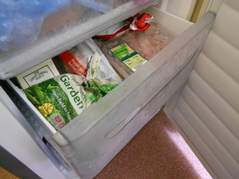
Today's reflection is immensely simple and practical - but it touches on one of the most important issues of our day. Food.
We've all heard it said, as children, 'Eat up. Some poor child in Africa would be glad to have what's on your plate.' And perhaps we've all thought, at times, 'Well, they're welcome to it. I don't want it.'
But food waste is a major problem. In the UK, 6.7 million tons of food is purchased for use in homes but discarded every year. That's worth over £10 billion, or £250-£400 per household. Potatoes, bread, apples and salads are the most frequently wasted. Domestic food waste accounts for 19% of solid waste taken by local authorities, adds pressure to landfill sites, and releases greenhouse gases and toxins whilst decomposing. Even when food waste is composted, the environmental impact is significant: it has already used land, fuel and nutrients to produce it, fuel to transport, store and display it for sale, and fuel to remove it for disposal.
Internationally, about a third of global food production is wasted, due both to losses in the production and supply chain and to the disposal of food by retailers and customers. That food represents a major investment in agricultural land at the expense of other land uses. Yet the World Food Programme estimates that 870 million people have insufficient to eat; malnutrition causes 2.6 million deaths amongst the under-5s each year, and a quarter of the world's children are physically stunted as a result of their poor diet.
One of the best-known miracles of Jesus is the Feeding of the Five Thousand. We can read it, scratch our heads, and wonder how it happened - or dismiss it as a tale that's grown in the telling.
Or we can change our own habits to help address, in some small way, the hunger of the world and the reduction of food waste. Of course that begins with discipline of trying not to buy any more than we need, and using the food which won't keep for long before the food which will. And there are plenty of additional ideas on the Love Food, Hate Waste campaign website http://england.lovefoodhatewaste.com/
And here's a simple thing to do during Lent. Why not make it part of your discipline to defrost and eat your way through the contents of your deep freeze (if you have one)? That will ensure you don't waste food through keeping it for too long. It'll save you money, which you might feel able to give to some good cause. And it'll free up space so you can put aside portions of food which would otherwise go to waste...and enjoy them, at the latest, during Lent next year.
We've all heard it said, as children, 'Eat up. Some poor child in Africa would be glad to have what's on your plate.' And perhaps we've all thought, at times, 'Well, they're welcome to it. I don't want it.'
But food waste is a major problem. In the UK, 6.7 million tons of food is purchased for use in homes but discarded every year. That's worth over £10 billion, or £250-£400 per household. Potatoes, bread, apples and salads are the most frequently wasted. Domestic food waste accounts for 19% of solid waste taken by local authorities, adds pressure to landfill sites, and releases greenhouse gases and toxins whilst decomposing. Even when food waste is composted, the environmental impact is significant: it has already used land, fuel and nutrients to produce it, fuel to transport, store and display it for sale, and fuel to remove it for disposal.
Internationally, about a third of global food production is wasted, due both to losses in the production and supply chain and to the disposal of food by retailers and customers. That food represents a major investment in agricultural land at the expense of other land uses. Yet the World Food Programme estimates that 870 million people have insufficient to eat; malnutrition causes 2.6 million deaths amongst the under-5s each year, and a quarter of the world's children are physically stunted as a result of their poor diet.
One of the best-known miracles of Jesus is the Feeding of the Five Thousand. We can read it, scratch our heads, and wonder how it happened - or dismiss it as a tale that's grown in the telling.
Or we can change our own habits to help address, in some small way, the hunger of the world and the reduction of food waste. Of course that begins with discipline of trying not to buy any more than we need, and using the food which won't keep for long before the food which will. And there are plenty of additional ideas on the Love Food, Hate Waste campaign website http://england.lovefoodhatewaste.com/
And here's a simple thing to do during Lent. Why not make it part of your discipline to defrost and eat your way through the contents of your deep freeze (if you have one)? That will ensure you don't waste food through keeping it for too long. It'll save you money, which you might feel able to give to some good cause. And it'll free up space so you can put aside portions of food which would otherwise go to waste...and enjoy them, at the latest, during Lent next year.
 RSS Feed
RSS Feed